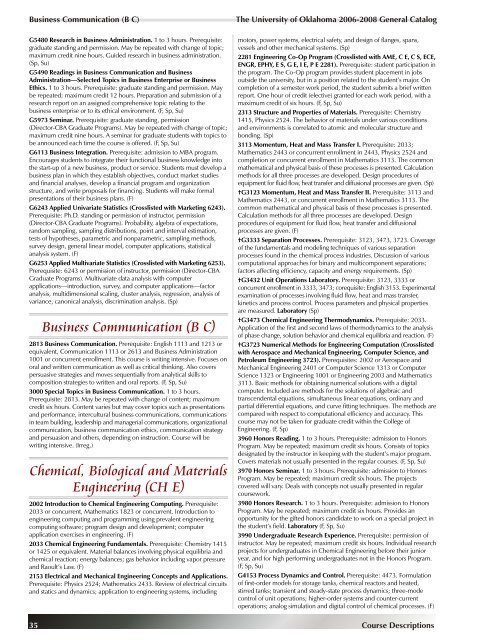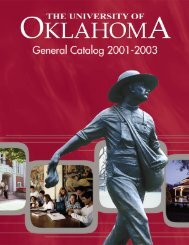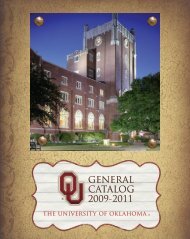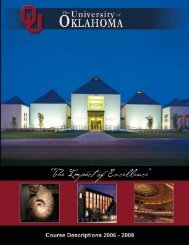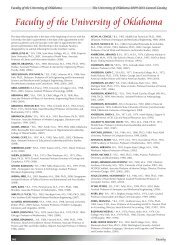ART - Catalog - University of Oklahoma
ART - Catalog - University of Oklahoma
ART - Catalog - University of Oklahoma
Create successful ePaper yourself
Turn your PDF publications into a flip-book with our unique Google optimized e-Paper software.
Business Communication (B C)<br />
The Uni ver sity <strong>of</strong> <strong>Oklahoma</strong> 2006-2008 Gen eral Cat a log<br />
G5480 Research in Business Administration. 1 to 3 hours. Prerequisite:<br />
graduate standing and permission. May be repeated with change <strong>of</strong> topic;<br />
maximum credit nine hours. Guided research in business administration.<br />
(Sp, Su)<br />
G5490 Readings in Business Communication and Business<br />
Administration—Selected Topics in Business Enterprise or Business<br />
Ethics. 1 to 3 hours. Prerequisite: graduate standing and permission. May<br />
be repeated; maximum credit 12 hours. Preparation and submission <strong>of</strong> a<br />
research report on an assigned comprehensive topic relating to the<br />
business enterprise or to its ethical environment. (F, Sp, Su)<br />
G5973 Seminar. Prerequisite: graduate standing, permission<br />
(Director-CBA Graduate Programs). May be repeated with change <strong>of</strong> topic;<br />
maximum credit nine hours. A seminar for graduate students with topics to<br />
be announced each time the course is <strong>of</strong>fered. (F, Sp, Su)<br />
G6113 Business Integration. Prerequisite: admission to MBA program.<br />
Encourages students to integrate their functional business knowledge into<br />
the start-up <strong>of</strong> a new business, product or service. Students must develop a<br />
business plan in which they establish objectives, conduct market studies<br />
and financial analyses, develop a financial program and organization<br />
structure, and write proposals for financing. Students will make formal<br />
presentations <strong>of</strong> their business plans. (F)<br />
G6243 Applied Univariate Statistics (Crosslisted with Marketing 6243).<br />
Prerequisite: Ph.D. standing or permission <strong>of</strong> instructor, permission<br />
(Director-CBA Graduate Programs). Probability, algebra <strong>of</strong> expectations,<br />
random sampling, sampling distributions, point and interval estimation,<br />
tests <strong>of</strong> hypotheses, parametric and nonparametric, sampling methods,<br />
survey design, general linear model, computer applications, statistical<br />
analysis system. (F)<br />
G6253 Applied Multivariate Statistics (Crosslisted with Marketing 6253).<br />
Prerequisite: 6243 or permission <strong>of</strong> instructor, permission (Director-CBA<br />
Graduate Programs). Multivariate data analysis with computer<br />
applications—introduction, survey, and computer applications—factor<br />
analysis, multidimensional scaling, cluster analysis, regression, analysis <strong>of</strong><br />
variance, canonical analysis, discrimination analysis. (Sp)<br />
Business Communication (B C)<br />
2813 Business Communication. Prerequisite: English 1113 and 1213 or<br />
equivalent, Communication 1113 or 2613 and Business Administration<br />
1001 or concurrent enrollment. This course is writing intensive. Focuses on<br />
oral and written communication as well as critical thinking. Also covers<br />
persuasive strategies and moves sequentially from analytical skills to<br />
composition strategies to written and oral reports. (F, Sp, Su)<br />
3000 Special Topics in Business Communication. 1 to 3 hours.<br />
Prerequisite: 2813. May be repeated with change <strong>of</strong> content; maximum<br />
credit six hours. Content varies but may cover topics such as presentations<br />
and performance, intercultural business communications, communications<br />
in team building, leadership and managerial communications, organizational<br />
communication, business communication ethics, communication strategy<br />
and persuasion and others, depending on instruction. Course will be<br />
writing intensive. (Irreg.)<br />
Chemical, Biological and Materials<br />
Engineering (CH E)<br />
2002 Introduction to Chemical Engineering Computing. Prerequisite:<br />
2033 or concurrent, Mathematics 1823 or concurrent. Introduction to<br />
engineering computing and programming using prevalent engineering<br />
computing s<strong>of</strong>tware; program design and development; computer<br />
application exercises in engineering. (F)<br />
2033 Chemical Engineering Fundamentals. Prerequisite: Chemistry 1415<br />
or 1425 or equivalent. Material balances involving physical equilibria and<br />
chemical reaction; energy balances; gas behavior including vapor pressure<br />
and Raoult’s Law. (F)<br />
2153 Electrical and Mechanical Engineering Concepts and Applications.<br />
Prerequisite: Physics 2524; Mathematics 2433. Review <strong>of</strong> electrical circuits<br />
and statics and dynamics; application to engineering systems, including<br />
motors, power systems, electrical safety, and design <strong>of</strong> flanges, spans,<br />
vessels and other mechanical systems. (Sp)<br />
2281 Engineering Co-Op Program (Crosslisted with AME, C E, C S, ECE,<br />
ENGR, EPHY, E S, G E, I E, P E 2281). Prerequisite: student participation in<br />
the program. The Co-Op program provides student placement in jobs<br />
outside the university, but in a position related to the student’s major. On<br />
completion <strong>of</strong> a semester work period, the student submits a brief written<br />
report. One hour <strong>of</strong> credit (elective) granted for each work period, with a<br />
maximum credit <strong>of</strong> six hours. (F, Sp, Su)<br />
2313 Structure and Properties <strong>of</strong> Materials. Prerequisite: Chemistry<br />
1415, Physics 2524. The behavior <strong>of</strong> materials under various conditions<br />
and environments is correlated to atomic and molecular structure and<br />
bonding. (Sp)<br />
3113 Momentum, Heat and Mass Transfer I. Prerequisite: 2033;<br />
Mathematics 2443 or concurrent enrollment in 2443, Physics 2524 and<br />
completion or concurrent enrollment in Mathematics 3113. The common<br />
mathematical and physical basis <strong>of</strong> these processes is presented. Calculation<br />
methods for all three processes are developed. Design procedures <strong>of</strong><br />
equipment for fluid flow, heat transfer and diffusional processes are given. (Sp)<br />
†G3123 Momentum, Heat and Mass Transfer II. Prerequisite: 3113 and<br />
Mathematics 2443, or concurrent enrollment in Mathematics 3113. The<br />
common mathematical and physical basis <strong>of</strong> these processes is presented.<br />
Calculation methods for all three processes are developed. Design<br />
procedures <strong>of</strong> equipment for fluid flow, heat transfer and diffusional<br />
processes are given. (F)<br />
†G3333 Separation Processes. Prerequisite: 3123, 3473, 3723. Coverage<br />
<strong>of</strong> the fundamentals and modeling techniques <strong>of</strong> various separation<br />
processes found in the chemical process industries. Discussion <strong>of</strong> various<br />
computational approaches for binary and multicomponent separations;<br />
factors affecting efficiency, capacity and energy requirements. (Sp)<br />
†G3432 Unit Operations Laboratory. Prerequisite: 3123, 3333 or<br />
concurrent enrollment in 3333, 3473; corequisite: English 3153. Experimental<br />
examination <strong>of</strong> processes involving fluid flow, heat and mass transfer,<br />
kinetics and process control. Process parameters and physical properties<br />
are measured. Laboratory (Sp)<br />
†G3473 Chemical Engineering Thermodynamics. Prerequisite: 2033.<br />
Application <strong>of</strong> the first and second laws <strong>of</strong> thermodynamics to the analysis<br />
<strong>of</strong> phase change, solution behavior and chemical equilibria and reaction. (F)<br />
†G3723 Numerical Methods for Engineering Computation (Crosslisted<br />
with Aerospace and Mechanical Engineering, Computer Science, and<br />
Petroleum Engineering 3723). Prerequisites: 2002 or Aerospace and<br />
Mechanical Engineering 2401 or Computer Science 1313 or Computer<br />
Science 1323 or Engineering 1001 or Engineering 2003 and Mathematics<br />
3113. Basic methods for obtaining numerical solutions with a digital<br />
computer. Included are methods for the solutions <strong>of</strong> algebraic and<br />
transcendental equations, simultaneous linear equations, ordinary and<br />
partial differential equations, and curve fitting techniques. The methods are<br />
compared with respect to computational efficiency and accuracy. This<br />
course may not be taken for graduate credit within the College <strong>of</strong><br />
Engineering. (F, Sp)<br />
3960 Honors Reading. 1 to 3 hours. Prerequisite: admission to Honors<br />
Program. May be repeated; maximum credit six hours. Consists <strong>of</strong> topics<br />
designated by the instructor in keeping with the student’s major program.<br />
Covers materials not usually presented in the regular courses. (F, Sp, Su)<br />
3970 Honors Seminar. 1 to 3 hours. Prerequisite: admission to Honors<br />
Program. May be repeated; maximum credit six hours. The projects<br />
covered will vary. Deals with concepts not usually presented in regular<br />
coursework.<br />
3980 Honors Research. 1 to 3 hours. Prerequisite: admission to Honors<br />
Program. May be repeated; maximum credit six hours. Provides an<br />
opportunity for the gifted honors candidate to work on a special project in<br />
the student’s field. Laboratory (F, Sp, Su)<br />
3990 Undergraduate Research Experience. Prerequisite: permission <strong>of</strong><br />
instructor. May be repeated; maximum credit six hours. Individual research<br />
projects for undergraduates in Chemical Engineering before their junior<br />
year, and for high performing undergraduates not in the Honors Program.<br />
(F, Sp, Su)<br />
G4153 Process Dynamics and Control. Prerequisite: 4473. Formulation<br />
<strong>of</strong> first-order models for storage tanks, chemical reactors and heated,<br />
stirred tanks; transient and steady-state process dynamics; three-mode<br />
control <strong>of</strong> unit operations; higher-order systems and counter-current<br />
operations; analog simulation and digital control <strong>of</strong> chemical processes. (F)<br />
35 Course Descriptions


